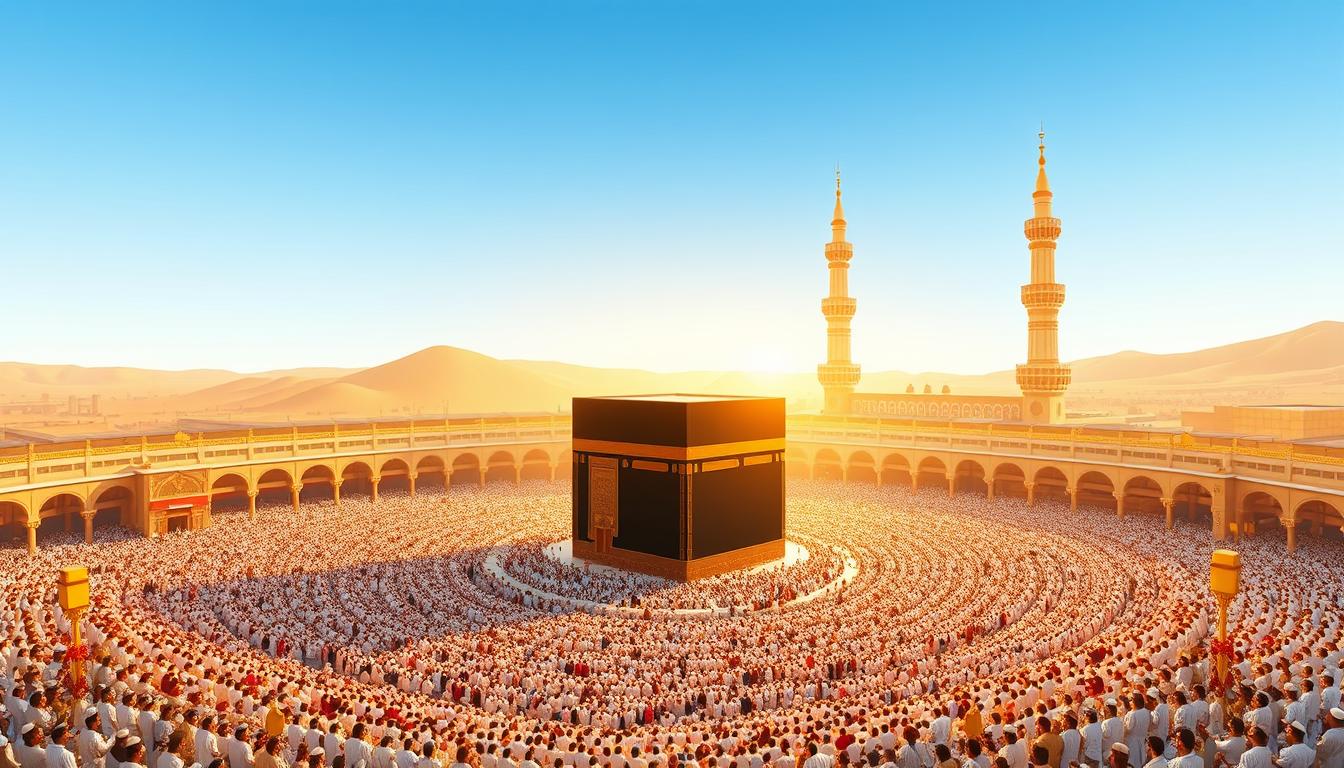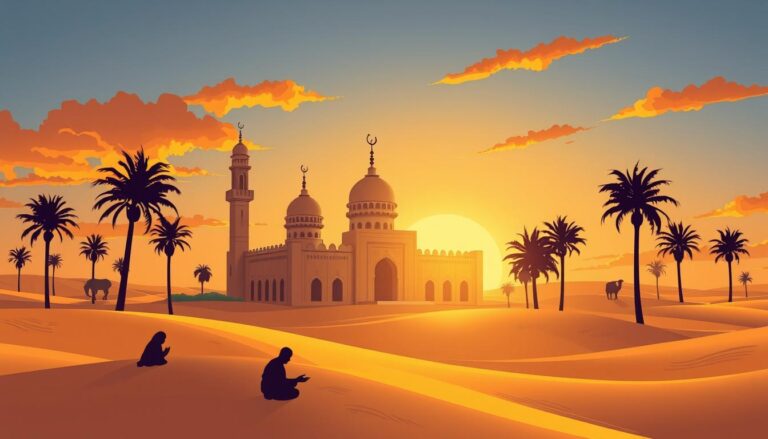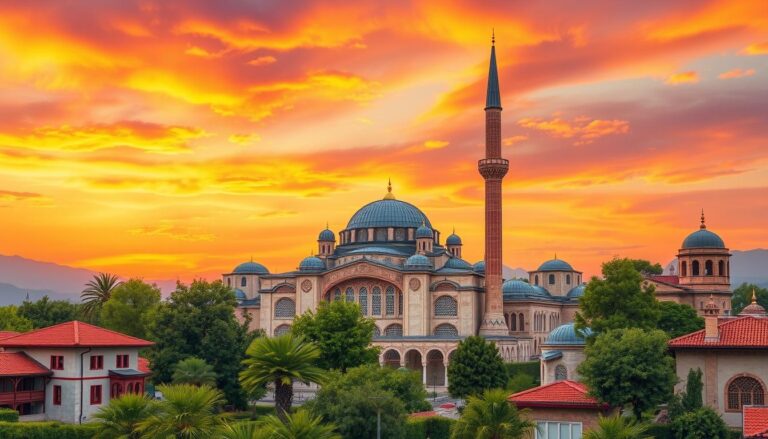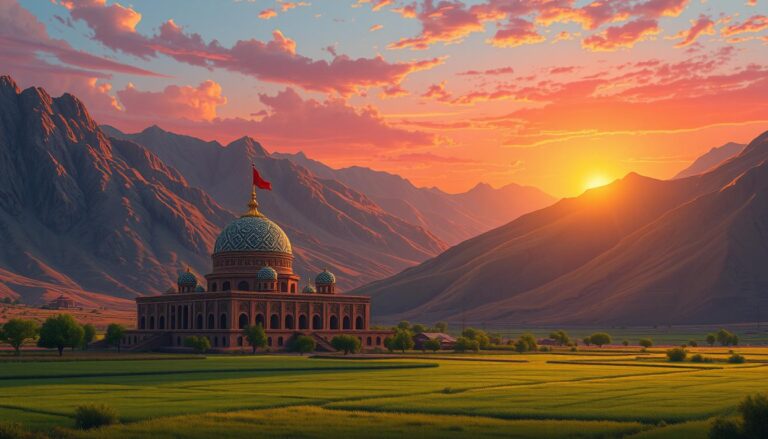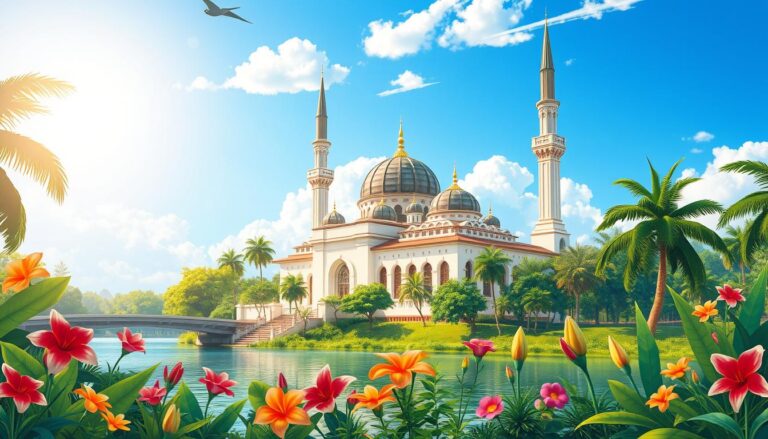Islam in Saudi Arabia
Saudi Arabia is where Islam was born and thrives. It’s the country’s main religion. The King of Saudi Arabia is called the “Custodian of the Two Holy Mosques.” This refers to the Kaaba in Mecca and the Prophet Muhammad’s mosque in Medina, Islam’s holiest sites.
The Wahhabi version of Sunni Islam has greatly shaped Saudi Arabia’s religious and political scene.
According to Boston University’s 2020 World Religions Database, about 31.5 million people in Saudi Arabia are Muslims. This is around 93% of the population. Most of these Muslims are Sunnis, with a Shia minority making up 10% to 15%.
Even with deep Islamic roots, Saudi Arabia has faced criticism for its strict religious policies. In 2023, it scored zero out of 4 for religious freedom. The United States Commission on International Religious Freedom (USCIRF) named Saudi Arabia one of 16 “countries of particular concern” for religious freedom violations.
Saudi Arabia: The Birthplace of Islam
Saudi Arabia is very important in Islam. It’s where Prophet Muhammad was born and where Islam’s holiest sites are. Mecca, the holy city, has the Kaaba. This is a sacred place Muslims pray towards every day.
Medina, the second holiest city, is where the Prophet Muhammad lived and was buried.
The Kaaba and the Holy Cities of Mecca and Medina
The Kaaba is a cuboid structure covered in a black cloth called the Kiswah. It’s the most sacred site in Islam. Muslims believe it was built by Prophet Abraham and his son Ishmael for worship.
Mecca, the city around the Kaaba, is Islam’s spiritual heart. It attracts millions of pilgrims each year for the Hajj and Umrah pilgrimages.
Medina, the second holiest city, is where the Prophet Muhammad started the first Islamic community. He moved there in 622 AD. The city is home to the Prophet’s Mosque, which has his tomb. It’s a key place for Muslims to visit.
The Migration of Prophet Muhammad and the Beginning of the Islamic Calendar
The Hijrah, Prophet Muhammad’s move from Mecca to Medina, was a key moment in Islam. It happened in 622 AD and started the Islamic calendar, the Hijri calendar. This lunar calendar has 12 months and 354 or 355 days. It’s used by Muslims to plan Islamic holidays and rituals.
“Islam is a religion of peace, and those who commit violence in the name of Islam are violating the core tenets of the Islamic faith.” – Queen Rania of Jordan
Islam in Saudi Arabia: The State Religion
Islam is the official state religion in Saudi Arabia. The Wahhabi interpretation of Sunni Islam is the main form practiced here. The Kingdom of Saudi Arabia is where the Islamic prophet Muhammad was born. The holy cities of Mecca and Medina are also in Saudi Arabia.
With most people being Sunni Muslim, Saudi Arabia is a strong center of Islamic faith and tradition.
The Influence of Wahhabism and the Al Saud Dynasty
The roots of Wahhabism, a strict branch of Sunni Islam, go back to the 18th century. A deal between scholar Muhammad ibn Abd al-Wahhab and emir Muhammad bin Saud started the modern Saudi state. The Al Saud dynasty has pushed Wahhabism both at home and abroad, making it the top choice in the country.
The impact of Wahhabism is clear in Saudi Arabia’s social and legal rules. These rules follow a strict Islamic law view. Public worship and spreading non-Muslim beliefs are banned in Saudi Arabia. The country’s laws mostly follow sharia, as seen through the Hanbali school of Sunni Islamic law.
“In a 2014 survey, 97% of young Saudis identified Islam as the main influence shaping their identity.”
The importance of Islam in Saudi Arabia is also shown by the King’s official title. It is “Custodian of the Two Holy Mosques,” showing the country’s role as the protector of Islam’s holiest sites.
The Five Pillars of Islam in Saudi Arabia
The Five Pillars of Islam are key for Muslims in Saudi Arabia. They include declaring faith, praying, giving to charity, fasting, and making a pilgrimage to Mecca. The Saudi government makes sure these practices are a big part of the country’s life.
The Shahada is the first pillar. It’s a statement of faith in one God and Prophet Muhammad. To become a Muslim, one must say this in front of witnesses.
The Salah, or prayer, is also very important. Muslims in Saudi Arabia pray five times a day, facing Mecca. Fridays are special for a big prayer called Jum’a.
The third pillar is Zakat. It means giving 2.5% of one’s wealth to help others. In Saudi Arabia, charities focus on Zakat, helping places like Gaza and Syria.
The fourth pillar is Sawm, or fasting. During Ramadan, Muslims don’t eat or drink from dawn to sunset. This month ends with the Eid Al-Fitr festival.
The last pillar is the Hajj pilgrimage to Mecca. Every Muslim should go at least once. In 2015, two million people from all over the world went, showing Islamic unity.
Saudi Arabia’s strong commitment to the Five Pillars of Islam is clear. The government supports these Islamic practices fully.
Islamic Law and Sharia in Saudi Arabia
Saudi Arabia’s laws are based on Sharia, the Islamic legal system. This system follows Islamic principles in all parts of society. The government uses a detailed judicial system to enforce Sharia, aiming to keep Islamic values alive.
The Legal System and its Foundations in Islamic Principles
The legal system in Saudi Arabia is mainly based on Sharia law. This law covers criminal, civil, commercial, and family matters. In 2010, Saudi Arabia aimed to codify Sharia, and a legal sourcebook was published in 2018.
Sharia is the main law, with punishments like beheading, stoning, amputation, and lashing. The court system was set up by King Abdul Aziz between 1927 and 1960. It includes Sharia courts and some administrative tribunals.
The Hanbali school of Islamic jurisprudence is mainly followed. Judges must consult six medieval texts from this school. But, they can also use other schools’ principles for justice and fairness.
Business laws in Saudi Arabia are set by royal orders, laws, and regulations. These are debated in the Shoura council and reviewed by the Council of Ministers. Sharia courts handle criminal, civil, and family matters, with the power to adjust contracts if needed.
“The primary source of law in Saudi Arabia is Islamic Sharia, derived from the Quran, the Sunnah, scholarly consensus, and analogical reasoning.”
The legal system in Saudi Arabia is built on Islamic values. The government enforces Sharia through a detailed judicial system. This approach has been criticized by Western human rights groups, but it remains the core of Saudi Arabia’s laws.
Islam in Saudi Arabia: Demographics and Diversity
Saudi Arabia is deeply rooted in Islamic traditions. The majority of its people, about 85-90%, follow Sunni Islam. Yet, the country also has a significant Shia minority, making up 10-12% of the population. This minority is more concentrated in the Eastern Province, where they are 25-30% of the people.
The Saudi government has traditionally supported the Wahhabi version of Sunni Islam. This has caused tensions and restrictions for Shia Muslims. The debate continues as the country tries to balance its Islamic values with the need for tolerance and inclusivity.
Sunni and Shia Muslims in Saudi Arabia
- Sunni Muslims make up 85-90% of the Saudi citizen population.
- Shia Muslims account for 10-12% of the citizen population, with a larger concentration in the Eastern Province, where they comprise 25-30% of the residents.
- The government’s historical preference for the Wahhabi interpretation of Sunni Islam has led to periodic tensions and restrictions on Shia religious practices.
- Saudi Arabia’s demographics reflect a diverse and complex religious landscape, with the government navigating the balance between Islamic traditions and the need for inclusivity.
“The diversity of religious beliefs in Saudi Arabia, while complex, underscores the country’s rich cultural heritage and the ongoing efforts to foster a more inclusive society.”
The Hajj Pilgrimage and Saudi Arabia
Saudi Arabia is the birthplace of Islam and home to Mecca and Medina. It hosts the annual Hajj pilgrimage, a key part of Islam. Over two million Muslims from all over the world come each year.
Accommodating Millions of Pilgrims Annually
The Hajj takes place over five days in Dhu Al-Hijjah. Once, the journey to Makkah was hard and expensive. But, Saudi Arabia has spent billions to improve the holy mosques and services for pilgrims.
Now, the Hajj is well-organized. Saudi authorities use a lot of resources to manage it. They have air-conditioned tents, medical clinics, and food points. Thousands of buses and millions of chilled water containers are also provided.
The Hajj brings Muslims together, creating unity and trust. It attracts 2-3 million Muslims from 183 countries, including 11,000 from the U.S. each year.
The COVID-19 pandemic has changed the Hajj. In 2020, only 1,000 pilgrims were allowed. In 2021, it was 60,000. In 2022, it was 1 million. Saudi Arabia is working hard to keep pilgrims safe while preserving the Hajj tradition.
Islam in Saudi Arabia: Preserving Islamic Traditions
Saudi Arabia, where Islam was born, focuses on keeping its Islamic traditions alive. The government follows strict Wahhabi rules of Islamic law. It also limits non-Muslim religious activities and cracks down on other Muslim groups seen as different.
The Department of Museums and Antiquities in Saudi Arabia was set up in 1974. It helps protect the country’s cultural and architectural treasures. The National Museum in Riyadh, opened in 1999, showcases Islamic artifacts. The Saudi Arabian Society for Culture and Arts, founded in 1972, supports local artists.
Restoring historic buildings and neighborhoods is a big part of preserving Islamic traditions. Modern Saudi architects blend traditional designs with Islamic concepts. This keeps the country’s architecture connected to its rich heritage.
Calligraphy, an ancient art, is highly valued in Saudi Arabia. It decorates mosques, offices, and homes. It reminds everyone of Islam’s lasting importance in the country.
“The preservation of Islamic traditions is not just a matter of preserving the past, but also a way of shaping the future. It is a testament to the enduring strength and resilience of Saudi Arabia’s religious and cultural identity.”
The Department of Culture at the Ministry of Culture and Information sponsors cultural events. These include literary clubs, drama, folklore, and arts and crafts. They help people appreciate Saudi Arabia’s Islamic heritage.
Saudi Arabia’s commitment to Islamic traditions is unwavering. It ensures the country’s rich religious and cultural identity is celebrated and passed on to future generations.
The Role of Saudi Arabia in the Islamic World
Saudi Arabia is a key player in the Islamic world. It is home to Islam’s holiest sites and is a major economic force. The country supports mosques, schools, and projects in Muslim-majority countries.
Promoting Islamic Solidarity and Development
Saudi Arabia does more than just host holy sites. It works to unite and develop the Islamic world. With its wealth and alliances, it aims to strengthen the Islamic world against Iran.
Here are some ways Saudi Arabia impacts the Islamic world:
- It hosts and finances big Islamic conferences to bring Muslim nations together.
- It helps build mosques, universities, and religious sites in Muslim countries.
- It supports Islamic NGOs and charities to help with development and humanitarian work.
- It uses its status as Islam’s birthplace to lead and influence the Islamic world.
But, Saudi Arabia’s push for power and its rivalry with Iran have caused tensions. The balance between its religious role and its political goals is complex.
“Saudi Arabia’s strategic rivalry with Iran has been exacerbated by the assertive actions of Crown Prince Mohammed bin Salman.”
Conclusion
Islam is deeply rooted in Saudi Arabian society and governance. The country is the birthplace of Islam and home to its holiest sites. It promotes the Wahhabi interpretation of Sunni Islam, making it a key player in the Muslim world.
While keeping traditional Islamic practices is a top priority, the Saudi government has faced criticism. This is for its strict enforcement of religious orthodoxy and treatment of religious minorities.
Despite this, Saudi Arabia plays a crucial role in shaping the global Islamic landscape. As the custodian of Islam’s holiest sites, it has a significant influence. The Kingdom’s efforts to uphold Islamic traditions and lead the Muslim world are vital.
These efforts will shape the future of Islam in the region and beyond. The intricate relationship between Islam and Saudi Arabia is complex. It is marked by reverence for traditional practices and ongoing challenges in adapting to a rapidly changing world.
The country’s leadership in the Islamic world will continue to be a topic of intense discussion. It will navigate the delicate balance between preserving its religious identity and responding to the evolving needs of its diverse population.
Source Links
- Religion in Saudi Arabia
- 5 facts about religion in Saudi Arabia
- The Embassy of The Kingdom of Saudi Arabia
- No title found
- Islam in Saudi Arabia
- 2022 Report on International Religious Freedom for Saudi Arabia
- The Five Pillars Of Islam
- What are the Five Pillars of Islam?
- Legal system of Saudi Arabia
- The application of Sharia law in Saudi Arabia | MEED
- Saudi Arabia – Islam, Sunnis, Shiites
- Demographics of Saudi Arabia
- Saudi Arabia – United States Department of State
- The Embassy of The Kingdom of Saudi Arabia
- Saudi Arabia: Hajj & Umrah Pilgrimages
- Hajj
- Culture & Art | The Embassy of The Kingdom of Saudi Arabia
- Saudi Arabia – United States Department of State
- Why Saudi Arabia and Iran are bitter rivals
- The Power of Saudi Arabia’s Islamic Leaders
- Freedom of religion in Saudi Arabia
- Saudi Arabia – Monarchy, Sharia, Tribes
- Saudi Arabia

